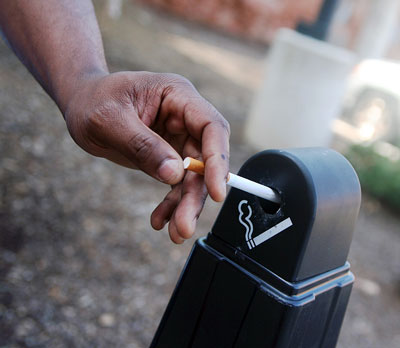By Jade McClain
YO:Durham Intern
the Durham VOICE
When you see someone smoking you might wonder do they really know what they are doing to their bodies.
Especially when it comes to teen smokers.

According to the Surgeon General, hardly anyone starts smoking after age 25. By age 18, 9 out of 10 smokers have already started. The younger someone starts using tobacco, the greater the chances that they will become addicted. (Photo by Jade McClain)
A recent report from the U.S. Surgeon General describes the shocking data of a rise in teen smoking.
This was the Surgeon General’s first statement on the matter since 1994.
According to the Centers for Disease Control, 10.8 percent of youth ages 12–17 smoke in North Carolina.
This ranks North Carolina 25th among the states.
The Durham VOICE recently reported that on average, a pack of cigarettes is about $5.58. Within a week’s time a smoker spends approximately $39.06.
For a month, that adds up to around $156.
Not exactly peanuts to a teenager.
According to the U.S. Department of Health and Human Services, there are 599 additives in cigarettes and also lists 33 carcinogens, or cancer causing chemicals, in the product.
For a while, things seemed to be getting better with teen smoking numbers.
According to North Carolina’s Health Wellness Trust Fund, cigarette smoking among middle and high school students had dropped significantly since 2003.
Middle school percentages dropped from 9.3 percent to 5.8 percent and high school percentages reduced from 27.3 percent to 20.3 percent.
There are three Teens Against Consuming Tobacco, or TACT, groups in Durham. These groups aim to tackle the smoking crisis affecting teens. One is located at Northern High School, another at Riverside High School and the last is a group called the TACT Leadership Council.
All of these initiatives fall under the Tobacco Reality Unfiltered, or TRU campaign. Although a national movement, TRU is working on getting every North Carolina teen smoke-free.
Many teens may be familiar with the commercials from TRU. Most involve touching stories from people who have been affected by someone who has died from smoking.
For example, one commercial, about a man named Justin, can be used as a reflection of smoking’s end result.
The commercial starts by telling us that Justin started smoking at the age 14. He decided to stop smoking at 28.
A few months after he quit, he was diagnosed with stage IV lung cancer.
Justin died a few months later, leaving behind his wife and young son.
The TRU commercials can remind teens of what and who they’re leaving behind or what they will miss out on by dying from a smoking related illness.
Christie Webb, a sophomore at City of Medicine Academy in Durham, has very strong opinions about teens that smoke.
She thinks the TRU commercials, and other available information about the dangers of smoking, does not make teens reconsider picking up a cigarette.
“No, because people are already set in their ways,” said Webb. “If they see nothing is happening to them, they won’t do anything to stop.”
According to the CDC, about 3,900 teens under age 18 start smoking each day.
Of the 3,900 teens that start smoking each day, 1,500 will become regular smokers.
The alarming statistics don’t shock Webb.
“I actually expected the percentages to be higher,” she said. “Teens these days don’t actually think about what can happen to them in the long run. They just don’t care.”
Often teens may smoke simply to mimic what they see.
According to the American Lung Association, exposure to pro-tobacco marketing and media more than doubles the chances of children and adolescents starting tobacco use.
If current tobacco use patterns persist, according to the ALA, an estimated 6.4 million current child smokers will eventually die prematurely from a smoking-related disease.
Jaketta Troy, a 7th grader at Shepherd Middle School, said she feels like smoking teens are wasting their life away.
“Those are cancer sticks,” said Troy. “You have a life ahead of you and smoking it is only wasting it.”